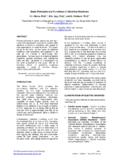Transcription of Sample Qualitative Research Proposal Published by ...
1 Sample Qualitative Research Proposal Published by Permission of the Author Dissertation Proposal Robert R. Maldonado Akamai University Title: A Phenomenological Pilot Study of Energy Healers Expertise and Recommendations for Energetic Disaster and Trauma Relief Training Introduction In order to effectively and consistently provide energetic disaster relief treatments for humanitarian disasters, there needs to be a training program to train volunteers and local social service providers. Few studies have focused on how to adequately and effectively integrate and train people in the knowledge of different energy systems in disaster relief.
2 Some trauma relief organizations such as The Trauma Relief Committee of the Association of Thought Field Therapy, Green Cross Association of Traumatic Stress Specialists, Common Bond Institute--Catastrophic Trauma Recovery Project (CTR) and others, have had much success providing training and coordinating teams of practitioners to deploy to assist victims and workers in need during incidents of trauma and disaster. The Association of Comprehensive Energy Psychology (ACEP) has provided initial relief work and training on a volunteer basis to local service providers during disasters (Feinstein, 2008).
3 Despite the effective use of energy psychology in Singapore, Sri Lanka, and Indonesia by ACEP members, no comprehensive training program or organizational structure exists to train a core of dedicated trainers for this type of work. The ACEP Humanitarian Committee has been tasked with developing a training model of best practices and how to move forward (Bulbrook, 2009). A study that addresses/defines energetic disaster and trauma relief training is important for several reasons. First, it brings the strengths of many energy systems to the field in the aftermath of trauma and disasters.
4 Second, it compiles a diverse wealth of potentially meaningful information/data from numerous experts in their respective fields that can be used to create a training program for relief workers in energetic disaster relief. Finally, it brings this information to a wider audience of practitioners and organizations to assist them in the development of their own training programs in disaster relief. Purpose of the Study --the purpose of this phenomenological study is to explore and understand through the obtaining of information from key participants in their respective energy systems, what they can contribute to energetic disaster and trauma relief training.
5 The overall aim of this study is to draw on the clinical expertise, field experience and the vision of key experts to help define the field of disaster relief training, identify needs and gaps, and make recommendations for further development in the implementation of energetic disaster preparedness and response efforts. Research Question 1) How do the experiences of the key participants contribute to energetic disaster and trauma relief training? Philosophical assumptions of the phenomenological strategy This study will utilize a descriptive Husserlian phenomenological strategy.
6 The Husserlian approach aims to identify the structure of experiences as described by the Research participants. Edmund Husserl, a German philosopher uncovered and described the fundamental structure of our life world emphasizing the description of a person s lived experience (Moustakas, 1994). Husserlian phenomenology, because of its descriptive orientation, is best suited for this study. This study will explore the lived experience of the participants in order to understand the essence of a person s account of their experiences as it relates to the phenomena in question energetic disaster and trauma relief training.
7 Phenomenology is considered a process as well as a method, and the procedure involves studying a small number of subjects through extensive and prolonged engagement to develop patterns and relationships of meaning. In this process the researcher sets aside his own experiences in order to understand those of the participants in the study (Creswell, 2009). The researcher will explore the individual lived experiences and expertise of the key participants through questionnaires and unstructured interviews. The participants were chosen because of their unique status, experience, and knowledge of their respective energy systems as they relate to disaster relief.
8 This Research design is appropriate because the responses of the participants will be shared and used in the development of a training model and protocols. Qualitative Research strategy Role of the researcher The role of the researcher in this study necessitates the identification of personal values, assumptions and biases at the outset of the study. The researcher served as a special operations commander in the Air Force, training combat helicopter aircrews and participated in military humanitarian relief operations in both Haiti and Honduras.
9 He is a practicing energy healer and teacher in private practice certified in numerous energy healing modalities. He is also a current member of the Association of Comprehensive Energy Psychology (ACEP) humanitarian committee assisting in the development of a training model for humanitarian disaster relief. He believes that these experiences enhance his awareness, knowledge, and sensitivity to the issues being addressed in this study and will assist him in working with the key participants. Although every effort will be made to ensure objectivity, the researcher s personal bias may shape the way he views and understands the data that is collected and their interpretation.
10 He recognizes the need to be open to the thoughts and opinions of others and to set aside his experiences in order to understand those of the participants in the study. Participants: The participants will be purposefully selected because of their unique expertise in their respective fields. The researcher will conduct the pilot study using a questionnaire and unstructured interviewing techniques; asking-open-ended questions of the participants about their unique expertise in their respective energy system and how it could contribute to disaster relief training.




